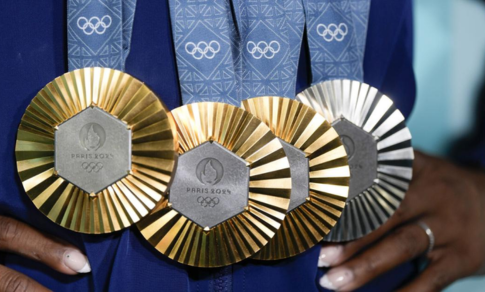At the 2024 Paris Olympics, Israel sent a delegation of 88 athletes and achieved its most successful Games to date, returning with seven medals, including one gold. This impressive haul placed Israel 41st in the official medal table, a notable achievement given its relatively small size and the considerable sporting traditions of many countries ranked below it. While the official standings offer one perspective, other metrics present Israel's performance in an even more favorable light, reflecting the diverse ways Olympic success can be measured.
Tom Reuvani's gold medal was a key contributor to Israel's 41st place in the medal table, which prioritizes gold medals. Alongside the gold, Israel secured five silver medals from Sharon Kantor, Inbar Lanir, Raz Hershko, the artistic gymnastics team, and Artyom Dolgupiat, as well as a bronze medal from Peter Palachik. This tally nearly doubles Israel's previous best, achieved during the Tokyo 2020 Games when it won four medals. In terms of total medals, which is a common metric in the United States, Israel ranked 36th.
In the weighted medal index, which assigns different values to gold, silver, and bronze medals, Israel ranked 29th with a total of 14 points. This index places gold medals as worth three points, silver two, and bronze one. The United States, China, and host nation France led this index, while Japan, despite its high ranking in the official table due to 20 gold medals, fell to sixth place behind Great Britain and Australia.
When measuring medals relative to population, the tiny Caribbean island of Grenada topped the list with two bronze medals. Dominica and Saint Lucia, also small Caribbean nations, followed closely. New Zealand, which excelled with 20 medals, including ten golds, was in fourth place. Israel, by contrast, was 34th in this index, highlighting how small nations can outperform larger ones in terms of medals per capita.
Another interesting metric is the number of medals in relation to a country's GDP. Grenada, Dominica, and Saint Lucia occupied the top three spots here, while Jamaica, despite its traditionally strong performance, was fourth with six medals, including only one gold. Israel, however, fell short, ranking 40th in this index.
A new ranking system developed by Robert Duncan and Andrew Pearce, known as the "population adjusted model," provides a different perspective. This model, detailed in the "Journal of Sports Analytics" and the "New York Times," adjusts medal expectations based on population size. According to this model, Israel's expected medal count was 1.32, yet it achieved a much higher result, placing it 28th in the ranking.

When evaluating medals relative to the size of the delegation, Kyrgyzstan and North Korea led, with each having won six medals from small delegations. Israel's performance in this regard was less impressive, ranking 47th among the 107 countries that sent at least ten athletes to Paris. This position contrasts sharply with its higher official ranking.
While many countries with small delegations returned without medals, others with high expectations were also disappointed. Israel, for instance, had a record of returning with at least one medal from every Olympics since Barcelona 1992, with the notable exception of London 2012. This year, Israel's performance was mixed, with a significant success in contrast to other countries that also faced setbacks.
Nigeria, with a delegation of 88 athletes, mirrored Israel's size but failed to win any medals. This disappointment echoed their performance in London 2012, where they also returned empty-handed despite sending a large team. Nigerian athletes, including the world record holder in the 100-meter hurdles, struggled to advance, highlighting the high expectations that were ultimately unmet.
Finland experienced an Olympic first by not winning any medals after competing in 50 consecutive Games. Despite sending a sizable team of 56 athletes, Finland's best results were fifth-place finishes. This marked a significant decline from previous Olympic successes, leading to calls for substantial changes to improve future performance.
India, the most populous nation, also faced disappointment despite sending the largest delegation to Paris. Although India won six medals, it fell short of the seven achieved in Tokyo 2020. The country's performance in javelin throw was particularly disheartening, as Neeraj Chopra, the reigning Olympic champion, could only secure silver, while Pakistan, with a smaller team, won gold.
Jamaica's results were notably disappointing compared to past Olympics. After a period of dominance, particularly in sprinting, Jamaica's athletes struggled, with their six medals being the lowest count in two decades. This included only one gold in discus throw, a significant drop from their previous achievements in sprint events.
In conclusion, the diverse metrics used to evaluate Olympic success reveal different facets of performance. While Israel's achievements were commendable, other nations, including Nigeria, Finland, India, and Jamaica, faced varying degrees of disappointment. These results illustrate the complexity of measuring Olympic success and the high expectations placed on athletes from countries with varying levels of resources and historical performance.









ADD A COMMENT :